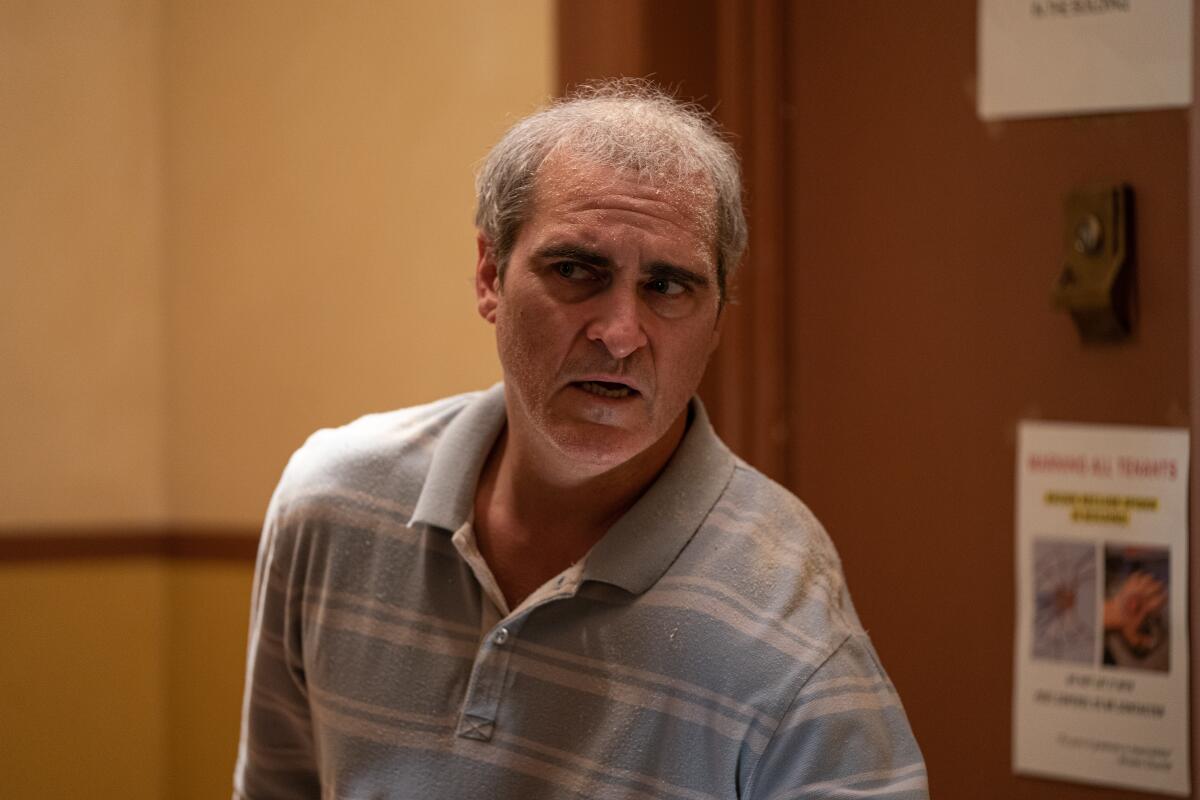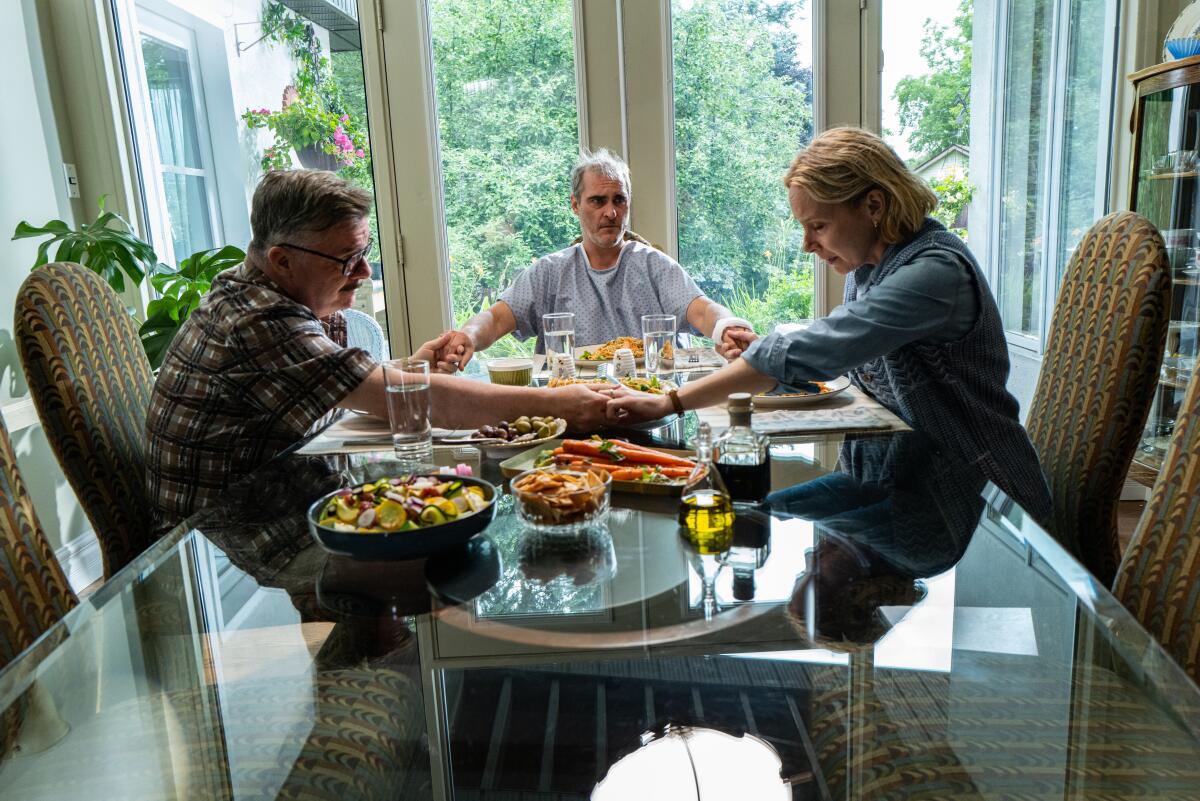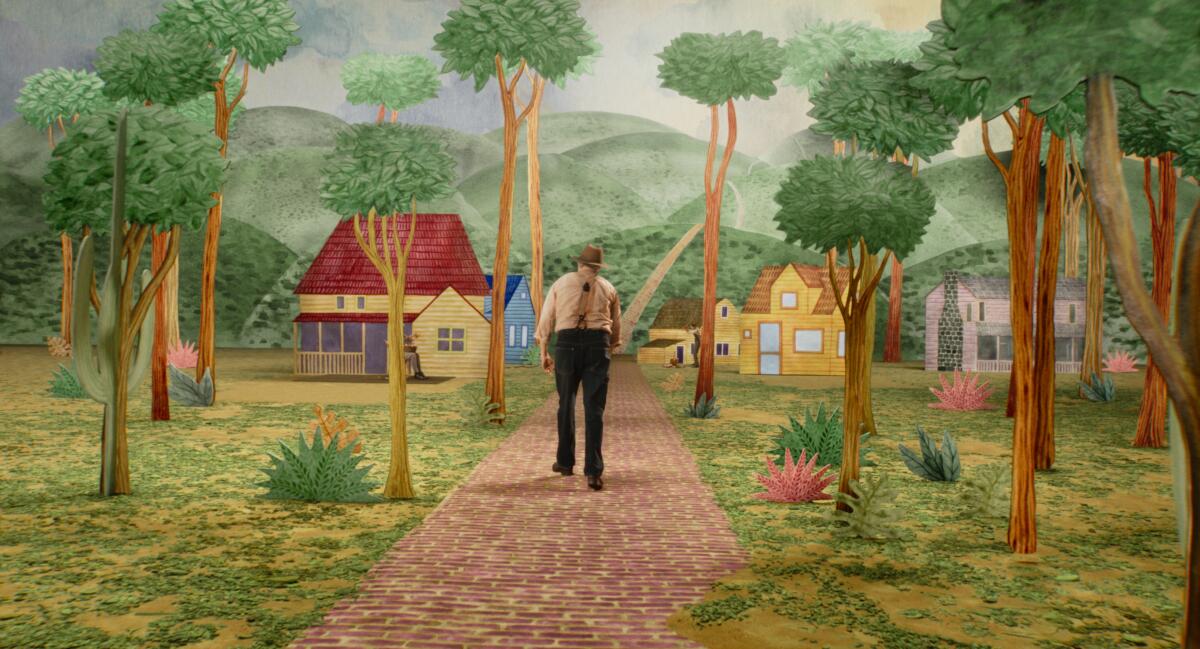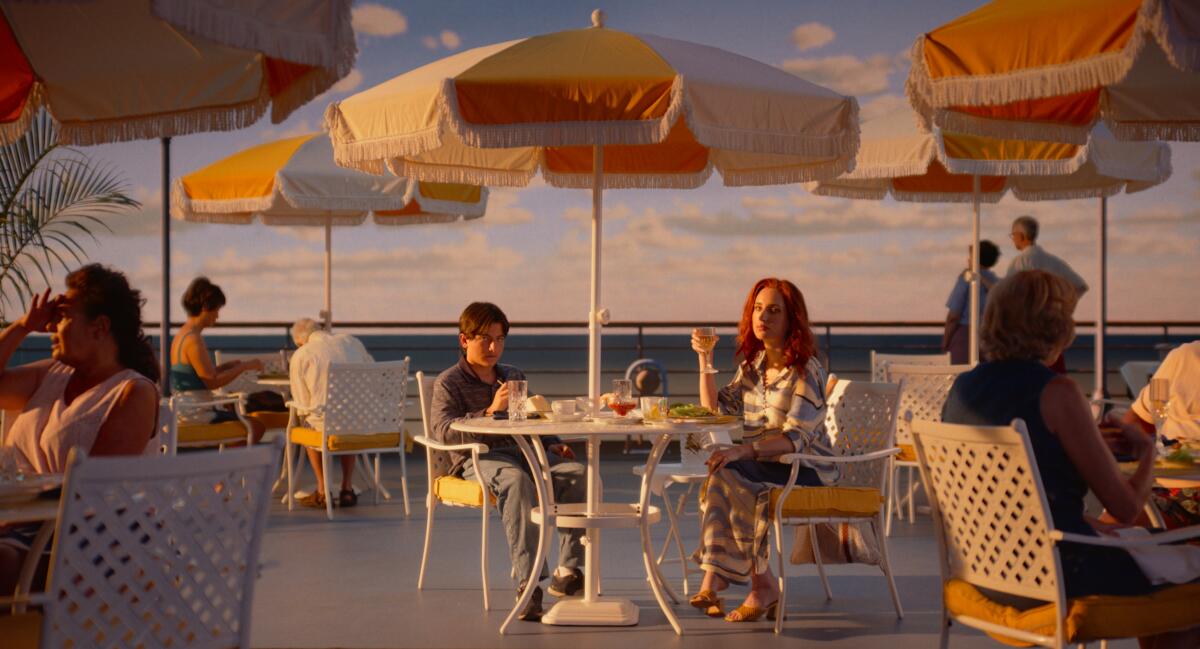‘Beau Is Afraid’ is quite an odyssey, but not necessarily an oughta-see

- Share via
The first word we see written down in “Beau Is Afraid,” Ari Aster’s raging Oedipal phantasmagoria of a movie, is “Guilt,” with a capital “G.” It’s not the last word to pop up in a story full of angry scribblings, earnest love notes, slick corporate logos, detailed sex-shop menus, foulmouthed graffiti and signposts both encouraging (follow every rainbow!) and cautionary (beware the brown recluse spider!). But Aster, a virtuoso of emotional annihilation, likes to pick at the scabs of his characters’ tortured consciences, as his fans will remember from “Hereditary” (2018), with its brutal drama of maternal ambivalence, and “Midsommar” (2019), in which a romance persists, fatally, out of obligation rather than love. Even by those standards, the guilt he lays bare in “Beau Is Afraid” is next-level; it carries the weight of a thesis and the rage of an indictment.
The man on trial is Beau Wassermann, a gray-haired, sad-eyed, stoop-shouldered, thick-gutted, droopy-testicled Jewish loner played by a wholly committed Joaquin Phoenix. Beau, true to the title, is afraid of a lot of things: illnesses, drugs, death, life, violent men, beautiful women, orgasms. One of the movie’s most unnerving qualities is the way it seems to both mock and confirm his fears, as if to suggest he’s both utterly paranoid and not paranoid at all.
And what Beau fears most of all is the possibility — nay, the inevitability — that his most shameful thoughts will be exposed for all to see, including his true feelings about the mother whose scornful judgment and smothering affection have been his scariest lifelong constants.
The “lifelong” part is established at the outset, with a flood of pulsing, contracting images and the sounds of a woman’s ever-escalating screams: We are being expelled, alongside baby Beau, from his mother’s birth canal. Beau is a source of disappointment and anxiety from the start, and it’s clear that little has changed when we see him several decades later, trudging with shell-shocked gaze and defeated posture into a meeting with his therapist (a sly Stephen McKinley Henderson). “Do you ever wish she were dead?” the therapist asks with a smile. “No!” Beau protests, a bit too vehemently. The movie will tell a very different story.

Really, it will tell four different stories, each with its own distinct tone, atmosphere and ratio of grisly shocks to twisted laughs. These episodes coalesce, after a fashion, into the bleakest of picaresque odysseys — a cracked meditation on Jewish guilt, filial rebellion and maternal awfulness that blurs the lines between horror and comedy, dream and memory, physical reality and psychological maelstrom.
You’ll be forgiven for remembering it as a brutal, barely modulated pummeling: Over the course of three frenzied but unhurried hours, Beau is chased, robbed, humiliated, nearly drowned, shot at, stabbed, hit by a car, abducted, shackled, drugged, framed for murder and repeatedly deceived and terrorized — a chain of abuses in which the only occasional respite is provided by a sudden blow to the head. (The movie could have been titled “Beau Is Concussed.”)
Still, Beau’s mission remains clear, even when not much else is: He’s going to visit his long-widowed mother, Mona, whom he hasn’t seen in quite some time, even though she lives a short flight away. (Mona is played, at different ages and in different registers of consciousness, by a creepily insinuating Zoe Lister-Jones and a typically indomitable Patti LuPone.)
But as we learn in the movie’s superbly controlled first story, leaving his shabby, barely furnished apartment — a Polanski-esque hideaway on a Boschian hellstreet — is easier said than done. With exquisitely moldering production design (by Fiona Crombie) and symmetrically precise camerawork (by Pawel Pogorzelski), Aster pulls us into a grubby, derelict purgatory where the mood is both apocalyptic and apathetic, and where nonstop revelers and knife-wielding predators are none too easy to tell apart.
Has the whole world gone mad, or just Beau? To the degree that the entire movie could be taking place almost entirely inside his head, does it really make a difference? When Beau’s trip gets waylaid by a stolen set of keys, some fuss about his prescription meds and a bizarre home invasion, you can’t help but wonder if you’re supposed to take Beau’s travails and tribulations at face value — or if you’re supposed to understand Mona’s barely contained fury (“It’s fine,” she growls through gritted teeth) when he calls and tells her he’s been unaccountably delayed.
And if you think Beau feels guilty about that, imagine how he feels when he finds out the next day that his mother got her face crushed in by a falling chandelier — a tragedy (sort of) and a sick joke, but really an auteurist flourish from a filmmaker who’s turned pulverized heads into a cherished motif. It’s a reminder, as if a reminder were needed, of exactly where we are, deep in the land of Unhappily Ever Aster.

If “Hereditary” insisted that home is where the horror is, while “Midsommar” found trouble in a far-flung paradise, then “Beau Is Afraid” arguably splits the difference: It’s a domestic chiller and a nightmare travelogue rolled into one. Determined to make it home in time for his mother’s funeral, Beau wanders through wildernesses both urban and suburban, through enchanted forests and animated deserts, by ambulance, by car, by cruise ship, by dinghy. (He also navigates a Möbius strip of cinematic references that bends its way from the mommy issues of “Psycho” to the dizzying simulacra of life in “The Truman Show” and “Synecdoche, New York.”) But by movie’s end, this battered, petrified soul seems to have barely moved — or rather, to have arrived where he first began.
It’s no coincidence that each of the four stories presents Beau with a different conception of home, or that each conception is found severely wanting. After fleeing his apartment, a gravely injured Beau finds himself recuperating in a well-appointed house where a friendly couple (Amy Ryan and Nathan Lane) look after him almost as painstakingly as they maintain their late son’s bedroom. But it’s clear from the mordantly satirical vibes (imagine a Todd Solondz remake of “Ordinary People”) and the house-arrest bracelet around Beau’s ankle that our bedridden hero has effectively exchanged one trap for another.
The third story springs Beau from that trap and leads him in a more hopeful, more stirring direction, and not merely because he manages to go several minutes without being abused or terrorized. I’m loath to say more, except that this chapter takes the form of a gorgeous coup de théàtre and situates Beau against lovely, striking animated landscapes (brought to life by the Chilean artists Cristóbal León and Joaquín Cociña, who directed 2018’s acclaimed “The Wolf House”). And it, too, conjures a startling vision of home, of a domestic bliss that Beau has scarcely allowed himself to imagine. It’s the movie’s loveliest moment and, perhaps for that very reason, its cruelest. Aster dangles the possibility of redemption only to snatch it gleefully away.

Will you cackle with him into the void? Or will you chuckle for a second, as I did, and squint to see if there’s anything more? “Beau Is Afraid” offers arresting confirmation of Aster’s talent and fresh evidence of his limitations. It’s a big, wildly ambitious swing of a movie, one that seems eager to liberate itself and its characters from the conventions of form and genre.
But that more expansive energy is at odds with and ultimately constrained by the story’s mother/man-child dialectic — a Freudian construct that feels reductive rather than revelatory, in a movie that’s never as scary or as darkly, transgressively funny as it seems to fancy itself.
Aster does pull off some haunting visual flourishes, especially an image of a moonlit ocean that suddenly fades into a rapidly filling bathtub — a striking encapsulation of just how tiny Beau’s world is. But that sequence also draws us into a maze of too-carefully constructed flashbacks that serve mainly to drive home the well-established fact of Mom’s transcendent awfulness. We don’t learn nearly enough about young Beau (Armen Nahapetian), other than that he’s a shy, awkward kid living a life of remarkable luxury (Mona is a successful businesswoman) but an emotional life of unenviable poverty.
Exactly how impoverished will be made grindingly clear in the movie’s fourth and most punishing story, as Beau experiences a homecoming marked by funereal gloom, riotous sex, scrotal imagery, ritualistic humiliation, memorable faces (Parker Posey, Richard Kind) and crushingly repetitive speechifying, plus the discovery that no matter how low he’s sunk, he can always sink lower still.
Phoenix, of course, rarely seems more at home as an actor than in the lower depths, which works to the movie’s advantage. His anguish here is so immediately poignant and recognizable, so on-the-surface accessible, that it can trick you into thinking there’s more to Beau as a character than just a whimpering avatar of trauma. Part of the movie’s conceit is that Beau’s guilt is such a paralyzing, all-consuming force as to obliterate any sense of who he really is, what he’s really done, what he’s genuinely guilty of. As a character, he has scarcely more emotional definition than the little white figurine he purchases early on as a gift for his mom.
Aster has always had a weakness for treating his characters like chess pieces, moving them toward their grim fates with breathtaking, sometimes agonizing deliberation. That approach worked brilliantly in “Hereditary,” which turned its protagonist’s dollhouse dioramas into a startling visual conceit and a hell of a satanic metaphor. It’s far less effective in an ostensibly more unhinged, unbridled work like “Beau Is Afraid,” where even the most surreal intrusion and the nuttiest non sequitur feels calculated to within an inch of its life. Aster may ultimately be too much the formalist control freak to achieve the crazy, let-it-all-hang-out catharsis he’s chasing, and the elaborate trap he’s engineered for Beau seems to close, finally, on himself. He’s made a guilt trip to nowhere.
‘Beau Is Afraid’
Rating: R, for strong violent content, sexual content, graphic nudity, drug use and language
Running time: 2 hours, 59 minutes
Playing: Starts April 14 at AMC Burbank 16 and AMC Burbank Town Center 6
More to Read
Only good movies
Get the Indie Focus newsletter, Mark Olsen's weekly guide to the world of cinema.
You may occasionally receive promotional content from the Los Angeles Times.









